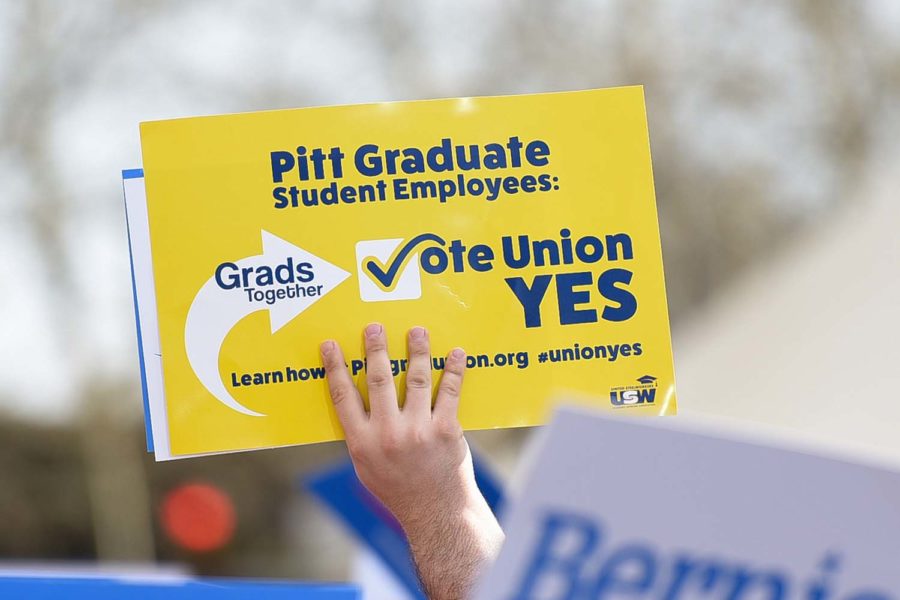Student organizers confident as unionization decision nears
The Pennsylvania Labor Review Board has determined that the University engaged in unfair labor practices during the grad student union election last spring.
August 26, 2019
Pitt and the graduate student union organizers each took their final legal step last week before the state labor board determines whether or not the University engaged in unfair labor practices during the elections held last spring.
Both groups submitted their responses in the form of a rebuttal at the hearing on May 2, at which the student organizers accused the University of voter intimidation.
But what the union organizers currently lack in solid answers for the future of the union, they make up for in confidence.
Mark Azic, a member of the graduate student union’s organizing committee and a Ph.D. candidate for economics, said he’s certain the judges on the Labor Relations Board will call for a revote after the complaints heard at a May 2 hearing.
“Given how close our election was, we only ended up losing by 37 votes out of 1400 votes, and the amount of complaints we made … we’re very confident that a judge is going to rule in our favor,” Azic said.
Last fall, the Pennsylvania Labor Relations Board determined that the graduate students at Pitt were employees, ruling against the University’s claim that they are solely students. Of more than 7,000 graduate students at Pitt, 2,000 were deemed to be the bargaining unit, making them eligible to vote in the union’s election.
After the elections this past spring, organizers alleged that the University participated in voter intimidation through using administrators as poll watchers and implementing unlawful list keeping practices. In one instance, the chair of the University’s Chemical and Petroleum Engineering department, Steven Little, sent out an email to the department disclosing the number of workers from their department who participated in the elections. Organizers say that both of these practices are illegal at the national level. However, since the University is a state institution, the decisions fall under the state’s labor board.
Organizers anticipate that the decision could come from the Labor Relations Board within the next month, according to Kimberly Garrett, a member of the organizing committee and a second-year graduate student in environmental and occupational health.
If the decision is in the union’s favor, the University would first have to post that they’ve engaged in unfair labor practices, Garrett said. After this, the process to have a new election could happen relatively quickly.
“It’s likely that then, the University, the Pennsylvania State Labor Relations Board and our union people would meet and discuss the best time, place, who would be poll watchers, stuff like that,” Garrett said. “I think that took about two weeks in the spring to determine where and when they would have the election. It could be as soon as a month after the decision is released.”
If the Labor Relations Board votes against the union, the organizers can try again in a year to hold an election to vote for a union.
“The fight is not over,” Garrett said.
Following the results of the spring elections, the organizing committee has kept up their momentum by holding meetings and reaching out to more graduate students.
“For the first election, there were parts of Pitt’s campus that we just didn’t know where people were located or we didn’t know that they were eligible to vote in time for the election,” Azic said. “So we’ve made a better outreach effort to do things like that.”
Despite the difficulties that they faced in the first election, organizers like Azic remain confident that the effort is a necessary part of securing the future of the union.
“There often are multiple votes,” Azic said. “The employer, the first time, will try to see how much they can get away with and then, a judge will call for a revote. We’re very confident a judge will file in our favor.”
The University and the Pennsylvania Labor Relations Board have not responded to requests for comment.








